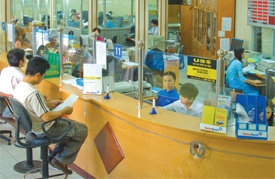Vietinbank bullish on bond prospects
 |
| A brighter economic outlook is increasing interest in Vietnamese banks |
Vietinbank last week announced it would issue from $500 million to $1 billion worth of international bonds in 2011.
“We expect to launch the issuance in the third or fourth quarter on anticipation of brighter macroeconomic prospects late this year,” said Vu Duc Tuan, from Vietinbank’s investment division.
Tuan said upon shareholders’ approval in early April, the bank would lay out a detailed scheme to seek the central bank and Ministry of Finance’s greenlight before submitting its proposal to the government.
The capital raised will be used for many national key projects that the bank is now carrying out such as petrochemical, hydropower, post and telecommunications and infrastructure projects.
Tuan said the government’s macroeconomic stabilisation policies would fully kick into gear later this year and benefit the issuance.
“In particular, international organisations’ views of Vietnam’s economic prospects are now better than late 2010 and early 2011,” he said.
The World Bank early last week stated that the Vietnamese government’s Resolution 11/NQ-CP dated February 24, 2011 on measures to rein in inflation and stabilise the macroeconomy was an important step in the right direction towards restoring the country’s image as one of the most attractive economic destinations in the region.
The international financial markets had reacted favourably, with Vietnam’s sovereign spread steadily declining over the past few days, the bank said.
“The yield rate of Vietinbank’s international bonds is expected to stay a little higher than the current yield of government bonds that will mature by 2016- 2020 of 5.8 per cent per year, but still under the over-high rate of 7-8 per cent,” said Tuan.
Meanwhile, Vietnam Bond Market Association general secretary Do Ngoc Quynh said in terms of yield rate, now could be favourable time for international bond issuance plans.
“Since the economic downturn, the US Treasury Bonds’ yield rate is staying low at about 3-4 per cent which is considered a good signal because foreign investors are likely to pay more attention to Vietnamese bonds,” said Quynh.
“Vietinbank’s good business results will also give a lift to the bank’s issuance,” he added.
On March 10, the International Financial Corporation (IFC), a World Bank financial arm, finished transferring all money for buying a 10 per cent stake in Vietinbank, which saw the bank have the second biggest chartered capital of VND16.858 trillion ($814 million) amongst Vietnamese commercial banks.
Vietinbank is selling a 15 per cent stake to Canada-based Bank of Nova Scotia. The deal is likely to be done in the third quarter of 2011.
Mac Quang Huy, deputy CEO at Ho Chi Minh City-based Thang Long Securities Joint Stock Company, said the participation of two big international financial companies as Vietinbank’s strategic shareholders would remarkably raise its financial ability and reduce the state’s stake in the bank to 65 per cent.
“Moreover, after being equitised in 2008, Vietinbank has a quite good revenue and asset growth. What international investors worry now is the transparency of Vietinbank’s bad debts regarding [scandal hit shipbuilder] Vinashin. I believe Vietinbank can successfully finish its overseas bond issuance plan with its expected yield rate of 5.8-7 per cent this year,” said Huy.
In 2010, the bank had revenue of VND12.1 trillion ($585 million) with an after-tax profit of VND3.4 trillion ($166 million), up 170 per cent and 172 per cent against 2009, respectively.
By the end of 2010, its total assets reached VND366 trillion ($17.68 billion), a 51 per cent year-on-year increase.
What the stars mean:
★ Poor ★ ★ Promising ★★★ Good ★★★★ Very good ★★★★★ Exceptional
Related Contents
Latest News
More News
- Cashless payments hit 28 times GDP in 2025 (February 04, 2026 | 18:09)
- SSIAM and DBJ launch Japan Vietnam Capital Fund (February 04, 2026 | 15:57)
- Banks target stronger profits, credit growth in 2026 (February 04, 2026 | 15:43)
- Vietnam on path to investment-grade rating (February 03, 2026 | 13:07)
- Consumer finance sector posts sharp profit growth (February 03, 2026 | 13:05)
- Insurance market building the next chapter of protection (February 02, 2026 | 11:16)
- NAB Innovation Centre underscores Vietnam’s appeal for tech investment (January 30, 2026 | 11:16)
- Vietnam strengthens public debt management with World Bank and IMF (January 30, 2026 | 11:00)
- Corporate bond market poised for stronger growth cycle (January 28, 2026 | 17:13)
- Vietnam's IPO market on recovery trajectory (January 28, 2026 | 17:04)

 Tag:
Tag:




















 Mobile Version
Mobile Version